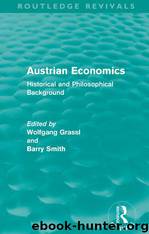Austrian Economics: Historical and Philosophical Background by Barry Smith Wolfgang Grassl

Author:Barry Smith, Wolfgang Grassl [Grassl, Wolfgang]
Language: eng
Format: epub
Tags: Industry, Economics, Finance, Business &
Publisher: T & F Books UK
Published: 2011-02-17T23:00:00+00:00
4. Eötvös: The Influence of the Ruling Ideas of the 19th Century on the State
A recent, extensive and well-researched monograph on Eötvös is Paul Body’s ‘Joseph Eötvös and the Modernization of Hungary, 1840–1870. A Study of Ideas of Individuality and Social Pluralism in Modern Politics’ (1972), which also contains a useful bibliography of the Hungarian literature on the subject. In 1966 Gerald Stourzh published a perceptive essay under the title ‘Die politischen Ideen Joseph von Eötvös und das österreichische Staatsproblem’, and in their works on Austrian political history both Robert Kann and Josef Redlich have written at some length on Eötvös. It is his views concerning the nationalities question and the reconstruction of the Monarchy after 1848 that mainly interest these authors. But they certainly do acknowledge the importance of Eötvös’s general political theory as formulated in his principal work The Influence of the Ruling Ideas of the 19th Century on the State. This work, Stourzh writes, ‘presents one of the most significant and original achievements of the European liberal theory of the state—if at the same time one which is today forgotten’.73 Redlich describes Eötvös as a man who, even by Western European standards, ‘was able to combine the highest political and literary scholarship of his age with a deeply rooted Magyar patriotism in the single, wholly original and creative personality of a modern political thinker and statesman’. The Ruling Ideas made its author ‘one of the most respected proponents of European liberalism at its height, and even today it is still to be described as one of the most singular and intellectually richest writings on the modern state’.74 Bödy characterises the book as an attempt to explain ‘why the Western European revolutions had failed in their quest to establish individual liberty in modern society’.75
Eötvös locates the sources of the European tradition of freedom first of all in the English liberal (as contrasted with the French democratic) tradition—but then ultimately in Christianity. His treatise begins with an explanation of the failure of liberal idealism in 1848. Liberty, equality and nationality he saw as the three ‘ruling ideas’ on which the revolutions of that year had been based. And they had failed, as Bödy expresses it in his summary, because of a ‘contradiction between two interpretations of these political ideas’76—loosely: the French, and the English. The French interpretation rests on the notion of an absolute sovereignty of the people: equality therefore signifies an equal entitlement to participate in the exercise of sovereignty. The English interpretation sees the possibility of a plurality of sovereign powers—King, parliament, the courts, cabinet, even the church and private associations—each limited by the others in such a way that there is no absolute power within the state and in such a way that the rights of individuals are clearly guaranteed.
This concept of liberty also defined the English understanding of equality. Its meaning was that each citizen enjoyed the equal protection of the laws, all citizens were entitled to the same freedoms, and all citizens were equal before the law.
Download
This site does not store any files on its server. We only index and link to content provided by other sites. Please contact the content providers to delete copyright contents if any and email us, we'll remove relevant links or contents immediately.
50 Economics Classics by Tom Butler-Bowdon(2571)
Six Billion Shoppers by Porter Erisman(2303)
Why Nations Fail: The Origins of Power, Prosperity, and Poverty by Daron Acemoglu & James Robinson(2297)
No Time to Say Goodbye(2117)
Red Notice by Bill Browder(2082)
Currency Trading For Dummies by Brian Dolan(1929)
The Economist [T6, 22 Thg9 2017] by The Economist(1927)
Thank You for Being Late by Thomas L. Friedman(1771)
Bitcoin: The Ultimate Guide to the World of Bitcoin, Bitcoin Mining, Bitcoin Investing, Blockchain Technology, Cryptocurrency (2nd Edition) by Ikuya Takashima(1699)
Amazon FBA: Amazon FBA Blackbook: Everything You Need To Know to Start Your Amazon Business Empire (Amazon Empire, FBA Mastery) by John Fisher(1575)
Coffee: From Bean to Barista by Robert W. Thurston(1546)
The Future Is Asian by Parag Khanna(1484)
The Great Economists by Linda Yueh(1454)
How Money Got Free: Bitcoin and the Fight for the Future of Finance by Brian Patrick Eha(1425)
Grave New World by Stephen D. King(1421)
Pocket World in Figures 2018 by The Economist(1419)
Capitalism Without Capital: The Rise of the Intangible Economy by Jonathan Haskel(1401)
The Sex Business by Economist(1386)
Cultural Intelligence by David C. Thomas(1289)
